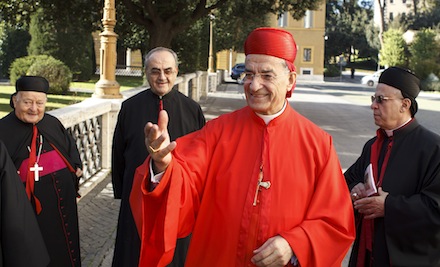In Lebanon, divorce and remarriage is not as prominent as it is in Europe and North America, so there is less focus on care for those types of situations.

by HILLARY MAST AND ELISE HARRISVATICAN CITY — The synod bishops on the family has provided an opportunity for people to bring up issues concerning marriage and family life facing Catholics around the world, but as one auditor has noted, not all of those issues are the same.
.jpg)
Selim and Rita El Khoury, spouses who are coordinators of the Pastoral Office of Marriage and Family in the Maronite Patriarchate in Lebanon, had the opportunity to participate as auditors in the synod, and they said that, although many issues are being discussed, not all of them apply to Catholics worldwide.
For example, family issues plaguing Catholics in Africa, such as polygamy, are not necessarily the same issues facing Catholics in Asia. “What I see generally [is that] each continent has its own problems … but there are some general for all, and there are specific problems,” Selim El Khoury told CNA Oct. 9. “What is good is the Pope is here every day listening to all, and we have a really interesting debate; everybody is giving his ideas.”
In Lebanon, divorce and remarriage is not as prominent as it is in Europe and North America, so there is less focus on care for those types of situations. The nuclear family remains strong there, with parents and children living under the same roof even once the children become adults, El Khoury said.
However, the slow economic environment in Lebanon has created a disruption in family life by causing many men to leave their families in search of work, sometimes taking them far from home
El Khoury’s office aims to reconcile families when this problem first arises, rather than intervening only when one spouse seeks an annulment or leaves the Maronite Church — an Eastern Catholic Church — for the Syriac Orthodox Church in order to get a divorce.
“We are [providing] formation for couples, so that they can seek help from the priest in the parish to try to solve the problems because they are getting so big and going to the tribunal,” he said.
The father of three said his children were able to join him and his wife of 25 years for a picture with the Holy Father.
“Our children were here to take photos with the Pope, and it was really something marvelous.”
At the start of the synod, Pope Francis took the opportunity to meet with nuncios from the Middle East to discuss the persecution of Christians and other religious minorities by the Islamic State, a militant Sunni Islamist caliphate.
“As you know, we in the Middle East are facing a really big danger regarding our existence there, especially [those who live in] Syria and Iraq,” El Khoury said.
Although the threat from the Islamic State is not as immediate in his country as it is in other areas of the Middle East, he said that Christians in Lebanon are still concerned.
“We are Maronites: We stick to our homeland, and we will never leave it.”
After the synod, the Holy Father has planned to hold a consistory with Middle-Eastern nuncios to further discuss issues facing Christians there. El Khoury hopes that they will use that time to pray for the persecuted and draft a letter to the United Nations.
“The United Nations has to move more quickly,” he said, “not to give food for the people who left their homes, but to help them regain their homes as soon as possible.”
Read more: http://www.ncregister.com/daily-news/maronite-synod-delegate-family-issues-facing-catholics-are-not-all-universa/#ixzz3GVwonv63
Marriage and Divorce in Lebanon
On the sidelines of the Synod in Rome last week, Lebanese Cardinal Bechara Rai, Patriarch of the Maronite Catholic Church, told reporters that Lebanon’s different faith confessions, not the state, govern marriage and divorce in their own communities. Explaining that civil marriages and civil divorces do not exist in Lebanon, he said they are considered religious issues subject to each faith group’s own regulations and procedures.
“In that way,” he noted, “the law protects marriage and the family. There are no laws contrary to natural or divine law. The state does not legislate anything having to do with marriage.”
He pointed out that one side effect of such a system can be seen in the example of a Catholic couple which wants to divorce. They can join another denomination such as the Orthodox churches which recognize divorce and second marriages. Citing another problem, the Patriarch said that when a Christian marries a Muslim but remains Christian, he or she cannot inherit the property of the Muslim spouse.